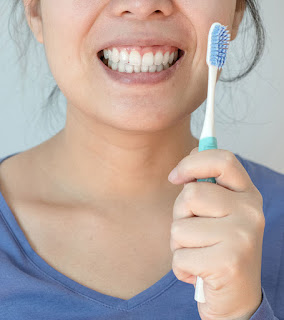BUCAL HYGIENE - Learn The Importance And Advantages Of Good Oral Hygiene
BUCAL HYGIENE - Learn the importance and advantages of good oral hygiene
 |
| BUCAL HYGIENE - Learn The Importance And Advantages Of Good Oral Hygiene |
Oral hygiene is the practice of keeping the mouth, teeth and gums clean and healthy, thus preventing and avoiding problems in the mouth such as cavities, periodontitis, gingivitis and even help to fight against halitosis (bad breath) . Good oral hygiene keeps your smile beautiful and your breath pure.
What is the purpose of oral hygiene?
- Prevent and prevent the formation of unwanted plaque, which is a sticky film of sugars and bacteria, which forms on the hard surfaces of teeth. Bacterial plaque can lead to more oral health problems such as tartar, cavities, gingivitis and periodontitis or periodontal disease.
- Improve your quality of life. A person with damaged teeth, or no teeth, can not chew food properly or speak properly. Good oral hygiene allows you to be able to perform food functions to the fullest, as well as preserve your speech, since your teeth last longer. It avoids embarrassing situations such as bad breath or an unpleasant smile.
What are the symptoms of poor oral hygiene?
- If your gums bleed or hurt frequently (especially when brushing your teeth) it is likely due to poor dental hygiene.
- If you have persistent bad breath, it does not go away easily.
- If brown or yellow deposits appear on the teeth, which arise due to calcification of plaque.
5 Practicable Tips For A Stronger Immune System
White Flour In Pregnancy: Fat Child
How to maintain good oral hygiene?
Proper oral hygiene will prevent the formation of plaque, which, as explained above, is the main factor leading to the formation of caries and periodontal disease. Parents should advise children about the proper methods of oral hygiene that should be practiced daily. You should consult your dentist and seek advice on the correct oral and dental hygiene practices to follow.
> Brush your teeth properly and floss daily. You should brush your teeth at least 2 to 3 times a day and floss.
> Use a mouthwash (fluoride mouthwash). Use regularly after brushing your teeth or flossing to eliminate the bacteria responsible for plaque formation, and especially if you have bad breath.
> The use of fluoride . Fluoride protects and strengthens teeth. Use fluoride in toothpaste, dental treatments, or taking a fluoride supplement. Remember, no excesses, be advised with your dentist.
> Try to eat balanced foods. Following a balanced diet plays an important role in oral health. A balanced diet includes all major food groups: fruits and vegetables, dairy products, meat, fish, etc.
> Visit your dentist regularly. You should go to the dentist at least every six months to maintain good oral health.
Blueberries Are High In Fiber And It Improves Brain Function
List Of Foods That Increase, Reduce And Cause Breast Cancer
What are the results of good oral hygiene?
- Your teeth will be cleaner and no residue, so your smile will look more beautiful.
- Your gums get healthier. Do not hurt or bleed when brushing or flossing.
- Your mouth is free of regular episodes of bad breath (halitosis).











No comments: